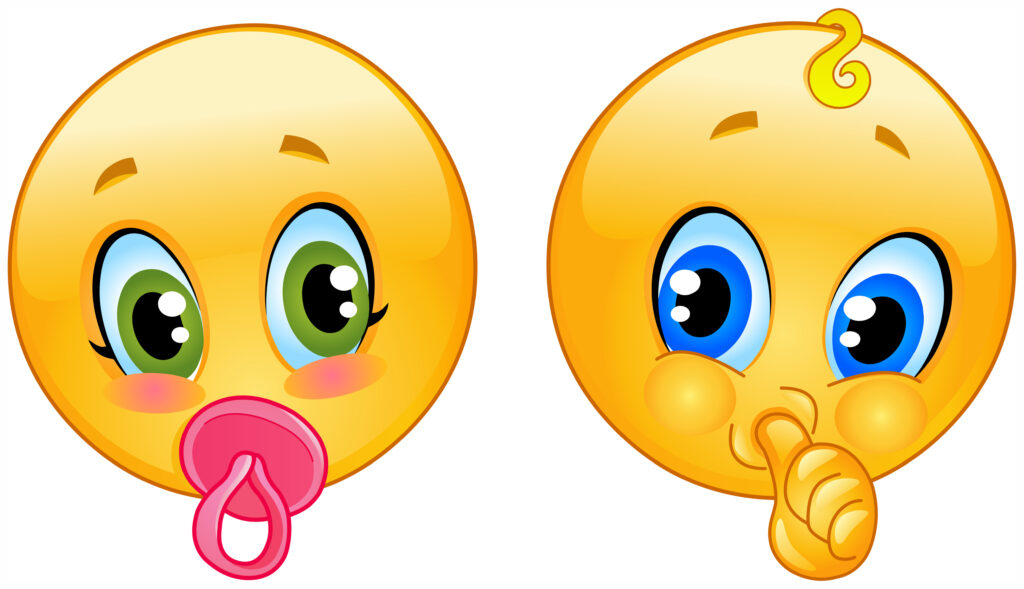Will Thumb Sucking or Using a Pacifier Hurt My Child’s Teeth?

At Dentistry for Children, we are often asked by concerned parents whether thumb sucking or pacifier use can be harmful to their children’s oral health. While most children outgrow these habits long before they can cause long-term problems, prolonged engagement in these behaviors can pose a risk to your child’s oral health. Dr. Halum and his kid-friendly team are here to provide you with tips and information on how to safeguard your little one’s smile and lay the foundation for a lifetime of healthy smiles.
Why Do Children Suck Their Thumbs or Pacifiers?
Sucking on thumbs, fingers, or pacifiers are common habits among infants and toddlers. The natural reflex provides a sense of comfort and security and a means to self-soothe, relax, and fall asleep. Most children stop sucking their thumbs or using pacifiers between ages 2 to 4 with no long-term damage to their teeth and jaws.
If thumb sucking or pacifier use continues beyond infancy and young childhood years, they can result in a host of oral health concerns, which is why we encourage parents to work on tapering off these habits at a young age. In fact, the Academy of Pediatric Dentistry (AAPD) recommends that you start reducing thumb sucking and pacifier use when your child is 18 months old.
How Do Thumb Sucking or Pacifier Use Affect Your Child’s Teeth?
Prolonged thumb sucking or pacifier use can interfere with the growth and development of the mouth and can lead to a host of complications. The extent of damage will depend on how aggressively and how long your child sucks on their thumb or pacifier.
But how does thumb sucking or pacifier use impact your child’s oral health? The pressure from sucking can lead to significant changes in the roof of the mouth. It can also gradually push the teeth out of position, causing changes in the shape of the face and mouth. It can also lead to jaw development concerns, protruding front teeth, misaligned teeth, and problems with the bite, including an overbite and underbite. These complications can lead to eating, speech, and even breathing difficulties.
Prolonged thumb sucking or pacifier use can lead to your child requiring extensive orthodontic treatments down the road. In some cases, headgear and other orthodontic appliances may be needed to undo the damage caused by these habits. Moreover, speech impediments resulting from these oral habits may require extensive therapy to correct.
How Can You Help Break Thumb Sucking and Pacifier Habits?
Most children give up thumb and pacifier sucking on their own, but some may need a little help. Remember – positive reinforcement goes a long way. Redirect your little one and offer plenty of praise when not thumb sucking or using a pacifier rather than scolding or punishing your little one. You may want to create a “Big Kid” reward system to celebrate milestones and daily successes.
Stopping thumb sucking or pacifier use starts from a young age. Offer distractions, such as teething rings, mobiles, or rattles. When your child is a toddler, set a day to celebrate being a big kid and put all the pacifiers away, offering a stuffed animal or lovey instead. When it comes to thumb sucking, you may want to cover the thumb with a bandaid during the day and have your child wear mittens during sleep.
Keep in mind that thumb sucking and pacifier use help kids self-soothe when they feel anxious, insecure, or in need of comfort. Focus on the root causes of the problem and help your child find other ways to cope with stressful situations. If your child continues thumb-sucking, talk to our team at Dentistry for Children. We are always happy to answer your questions, address your concerns, and offer tips and guidance to help your child break these harmful oral habits. If all else fails, we may recommend oral appliance therapy to safeguard your child’s smile.
Understanding Orofacial Myofunctional Disorders
Orofacial myofunctional disorders are disorders of the muscles and functions of the face and mouth that may impact normal growth, development, or a child’s function of orofacial structures. It is characterized by improper tongue, lip, or jaw positioning when eating, swallowing, or speaking. Orofacial myofunctional disorders can develop in children with prolonged thumb sucking or extended use of pacifiers.
Introducing Myofunctional Therapy
Myofunctional therapy is an exercise program designed to retrain the muscles of your little one’s tongue, face, mouth, and throat, correcting improper function. Rather than using appliances, this form of therapy focuses on the muscular patterns and posture of your child’s mouth, face, and throat.
Our team at Dentistry for Children will work with your child to correct muscle patterns. We will practice proper tongue placement, lip closure, jaw positioning, and swallowing patterns. We also focus on strengthening and improving the coordination of the muscles involved in speech, chewing, and swallowing. If your child is struggling with thumb sucking or pacifier use, myofunctional therapy can help them break these habits and guide healthy growth and development.
Myofunctional Therapy Near Me in Highland, IN
Contact Dentistry for Children to learn more about combatting the effects of prolonged thumb sucking and pacifier use. Dr. Halum and our kid-friendly team are here to offer tips and guidance to help you get these harmful habits in check. He may also recommend myofunctional therapy to help encourage healthier oral habits, safeguarding your child’s smile. We invite you to call our office at 219-924-5437 to schedule an appointment or use our online form to request one today!
